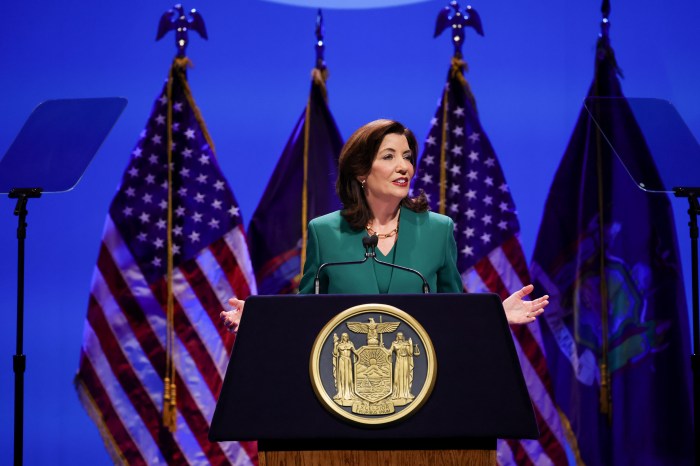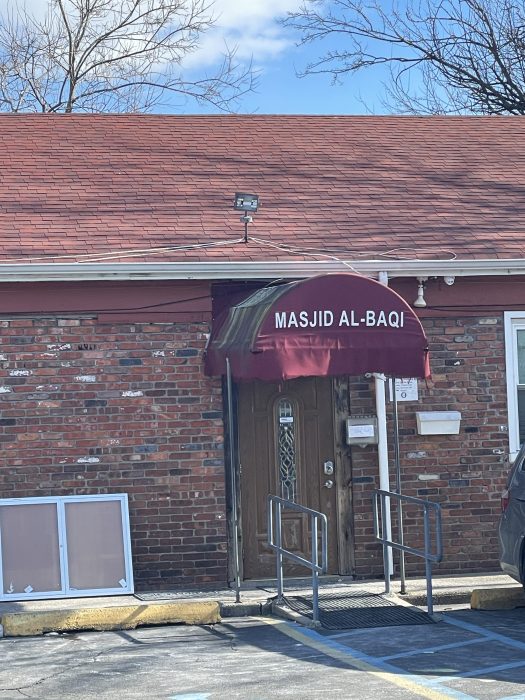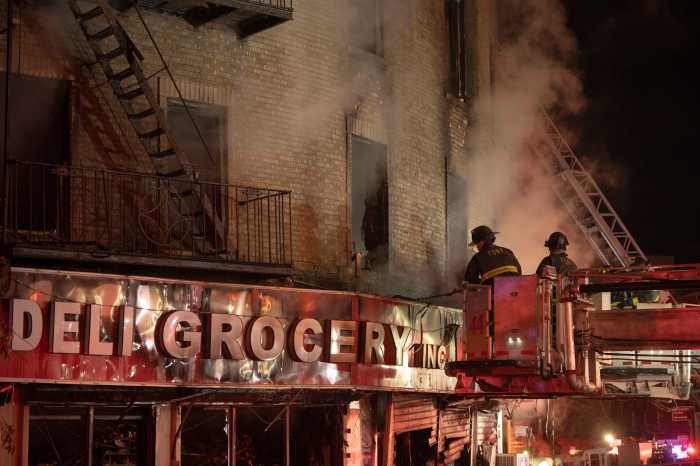
State and federal authorities are considering new criminal charges against Gerard Terry, the former Town of North Hempstead Democratic leader. Officials are gravely concerned that Terry may have practiced law after he was disbarred last year. If these allegations are true and accurate, there will be far-reaching consequences for Terry, as well as his illicit law clients.
Terry pleaded guilty to state and federal tax-fraud charges. He is awaiting sentencing in both courthouses.
On Tuesday, May 15, acting State Supreme Court Justice Christopher Quinn took the unusual step of jailing Terry in advance of the sentencing date. The judge did not say anything about the new allegations involving Terry and whether these allegations triggered the court’s decision to place Terry in custody.
Terry was a stalwart in Nassau County politics for more than 25 years. He personally picked many of the men and women who became judges throughout the county and played an integral role in every political race since the 1980s.
He was disbarred on Sept. 25, 2017, when he pleaded guilty to criminal tax fraud in the fourth degree, a class E felony. Despite the revocation of his law license, however, Terry was observed practicing law in Nassau County District Court in Hempstead.
On May 2, 2018, numerous individuals observed Terry practicing law in the Landlord/Tenant section of the courthouse. One witness took photographs and notified court personnel.
A review of the official court database, available online, reflects that Terry appeared in court and represented himself to be an attorney. According to the database, Terry was the “attorney of record” and he improperly represented Concetta Terry and Alicia Terry—more than seven months after his law license had been revoked.

The documents in the file reflect that Terry went to court and negotiated the settlement agreement. Terry also signed the settlement contract as the “attorney of record.” This contract was filed with the court. Ultimately, James M. Darcy, the judge sitting in the Landlord/Tenant courtroom, relied on it when he issued the final court order.
According to Benjamin Brash, a partner with Rukab Brash PLLC in Great Neck, the court order is likely invalid and the case probably needs to be reopened.
“Both parties need to be represented by an attorney and that obviously didn’t happen,” noted Brash. “I expect that the court will have to take the highly unusual step of notifying all the litigants and requiring everyone to return to the courthouse with licensed attorneys. That’s the only way to ensure that everybody made properly informed decisions, based on sound legal advice. When people claim to be attorneys and they’re not, it creates huge problems for everyone.”
According to New York State Judiciary Code, Section 478, disbarred attorneys are strictly prohibited from entering courtrooms and giving legal advice, unless they are representing themselves. Disbarred attorneys who violate this law can be convicted of a felony.
“The appearance of justice is undermined when a person not licensed to practice law practices law,” said Jeffrey Ullman, a frequent lecturer on legal ethics and a partner at Ullman, Furhman & Platt in Morristown, NJ. “People’s capacity to ignore the consequences of their own behavior is truly astonishing. Law is supposed to be an honorable profession and a lawyer who would practice law when he’s been disbarred dishonors himself and the profession. It embarrasses me as an attorney.”
Ullman went on to explain that such actions destroy our values as a society.
“A disbarred lawyer who would do that erodes the very basis of how we live as a society,” Ullman continued. “It undermines the basic essence of being a lawyer and the foundation of trust. The practice of law requires the highest degree of integrity and honesty. It erodes everything. Doing the right thing is doing the right thing.”
While some people might argue that what Terry did was OK because he was representing family, Ullman disagrees completely.
“It’s absolutely not OK,” explained Ullman. “Practicing law without a license is a crime. You can’t impersonate a lawyer.”
Now that Terry has been photographed representing “clients” in court, should the authorities do a thorough review to see if he represented anyone else?
“That’s up to them,” suggested Ullman. “That’s what we have district attorneys for. It’s up to the bar association to take any steps they deem appropriate. Most lawyers take their responsibilities very seriously. Martin Luther King Jr. said, “The arc of history bends toward justice.’ We get there in bits and pieces, step by step. Every time a lawyer does something inappropriate, it takes us back a step.”
Disbarred attorneys are required to notify the state disciplinary board of their felony convictions to ensure that their names are promptly removed from the list of licensed attorneys. Terry failed to notify the disciplinary board and his name was removed belatedly.
“It’s a violation of public trust,” noted Ullman. “A lawyer is supposed to be a person of honor and integrity, someone who will fight for their clients’ rights. Terry pleaded guilty. It has greater significance than a guy just putting on a suit and pretending to be a lawyer.”
These new allegations against Terry are particularly surprising, because a wide array of current and former elected officials have personally contacted the federal court and asked the judge to grant leniency to Terry. Many of these elected officials describe Terry as a gifted attorney and honest man. New York State Comptroller Tom DiNapoli and Congressman Tom Suozzi are two of the officials who wrote letters.
Jon Kaiman, former supervisor of the Town of North Hempstead, is another high-profile friend, who reached out to the judge. On Feb. 7, Kaiman wrote the court and described a 30-year friendship. He asked the judge to treat Terry with leniency and he cited several factors to consider. One of those factors was the disbarment of Terry.
“While the tax obligations remain, he will now have a criminal conviction and, as I understand it, legal disbarment,” read the letter by Kaiman.

According to numerous sources, officials are reviewing court records to determine if there were any other “clients” represented by Terry. If state authorities determine that Terry accepted payment for legal services, he can also be charged with larceny.
The new allegations may throw Terry’s upcoming sentencing hearings into turmoil, even if prosecutors decline to file new charges. In January, the federal prosecutor, Artie McConnell, strenuously opposed releasing Terry on bail. McConnell strongly cautioned the court that Terry has an extraordinary history of “lying to government officials, filing false documents and using corporate shells and nominee accounts.” Most strikingly, he reminded the court, that “the defendant’s tax evasion [scheme] involved him abusing his various public positions and political influence to enlist others in his criminal endeavors.”
Ultimately, federal court Judge Joanna Seybert decided to release Terry on bail, but she admonished him that there would be grave consequences if he committed any new crimes.
Terry, who is being held at the Nassau County Correctional Center in East Meadow, is scheduled to be sentenced in the federal case on May 29.
Read the follow-up story here.
































